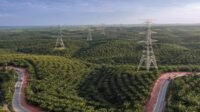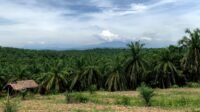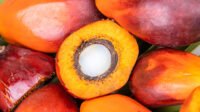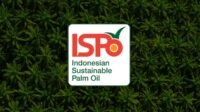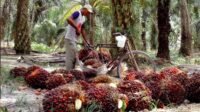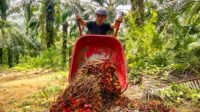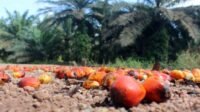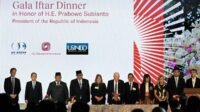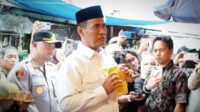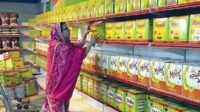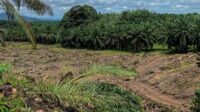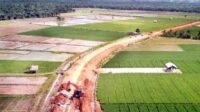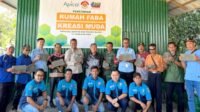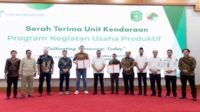PALMOILMAGAZINE, JAKARTA – The GRASS Project (Greening Agricultural Smallholder Supply Chains), implemented by GIZ (Deutsche Gesellschaft für Internationale Zusammenarbeit) and funded by BMZ (the German Federal Ministry for Economic Cooperation and Development), officially concluded on Tuesday (Nov 18, 2025) with a closing ceremony in Jakarta.
GRASS continued the work of the earlier SASCI (Sustainable Agricultural Supply Chains in Indonesia) project (2020–2022), building on its achievements and lessons learned. Today’s event marks the culmination of six years (2020–2025) of collaboration between GIZ and the Directorate General of Plantations, Ministry of Agriculture of the Republic of Indonesia.
Amid the growing impacts of climate change and global crises, smallholders face increasing challenges and vulnerabilities. GRASS supported smallholder farmers in diversifying their agricultural production to build more stable, biologically robust, and climate-resilient farming systems. By promoting approaches such as permaculture and agroforestry, the project enhanced soil fertility, water conservation, and biodiversity while opening new income opportunities for farmers.
Also Read:
Beyond productive agriculture, GRASS also focused on market access, agricultural extension systems, and the use of digital technologies to support sustainable farming. Through diversification, resilience-building, and innovation, the project empowered smallholders and strengthened sustainable agricultural supply chains in Kapuas Hulu District, West Kalimantan. Proven approaches developed under GRASS have also been shared with broader agricultural stakeholders for replication beyond Kapuas Hulu.
Over the past three years, GRASS has trained 1,100 smallholders on climate-resilient farming practices, increased the incomes of 600 smallholder households by an average of 15%, and provided technical assistance to more than 500 farmers adopting climate-smart agriculture.
The closing ceremony also serves as a springboard for continued collaboration under the Green Climate Fund (GCF), which will further enhance climate adaptation and mitigation efforts in West Kalimantan from 2025 to 2032.
Also Read:
Baginda Siagian, Director of Oil Palm and Various Perennial Crops at the Ministry of Agriculture, emphasized that the GRASS Project plays a strategic role in advancing Indonesia’s agricultural priorities. “By promoting sustainable and diversified farming practices, GRASS contributes directly to our national goal of building climate-resilient and sustainable plantation crops,” he told in a statement to Palmoilmagazine.com.
Dr. Angelika Stauder, representing BMZ at the German Embassy in Jakarta, shared a similar view: “The GRASS Project demonstrates Germany’s strong commitment to supporting Indonesia on its path toward sustainable and climate-resilient agriculture. By empowering smallholders and promoting responsible supply chains, GRASS advances our shared goals of protecting the environment and improving rural livelihoods.”
Ferry Suryanata, S.Hut, Head of Plantations at the Agriculture and Food Agency of Kapuas Hulu District, added, “GRASS has delivered tangible benefits for our smallholder communities. Through training, technical support, and new market opportunities, our farmers are now more resilient and better prepared for climate challenges. We appreciate this collaboration, which aligns with our vision for sustainable rural development.”
GIZ Country Director for Indonesia, Hans-Ludwig Bruns, emphasized the project’s impact: “Over the past three years, GRASS has shown the power of strong partnerships united under a shared mission. The achievements in Kapuas Hulu demonstrate how empowering smallholders contributes not only to better livelihoods but also to climate resilience and biodiversity protection. GIZ remains committed to continuing this journey with our partners.”
Representing the farmers, Maskur and Nining said, “Through GRASS, we learned how to manage our farms more sustainably and diversify our production. The project strengthened our farmer groups and improved our market access. We hope this partnership will continue to support smallholders like us in the future.”
The GRASS closing event also featured an exhibition of supported smallholder products, followed by a panel discussion exploring opportunities to scale up project achievements. The discussions emphasized ensuring that lessons from GRASS continue to strengthen the economic and environmental resilience of rural communities in Kapuas Hulu, West Kalimantan, and other regions in Indonesia.
About the GIZ GRASS Project
The GRASS Project (Greening Agricultural Smallholder Supply Chains) was funded by the German Federal Ministry for Economic Cooperation and Development (BMZ) and implemented by GIZ in partnership with the Directorate General of Plantations, Ministry of Agriculture of Indonesia. Running from 2023 to 2025, the project aimed to strengthen the economic and environmental resilience of smallholder farmers embedded in global supply chains in Indonesia. (P3)



